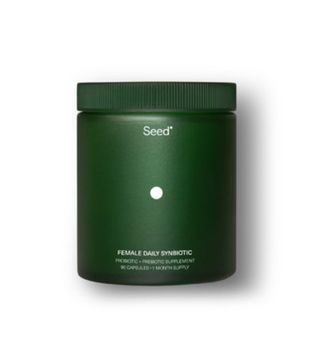Make Over Your Mood: 21 Small Ways to Feel Happier Right Now


Mood is a finicky thing. As easy as it might be to attribute our disposition to an ever-shifting equation of external circumstances—job, social life, and relationships, to name a few—in reality, these details compose just one dimension in a rather complex web of brain chemistry, hormones, and overall well-being. Something as seemingly unrelated as your gut health, for example, can hugely influence how you're feeling on a given day.
But this also means that turning your mood around can be as easy as making a few adjustments to your lifestyle or engaging in a self-care ritual. With that in mind, we're counting down 21 simple, science-backed ways to feel better in mere minutes—or less.

Head outside. Feeling happier is simply one of the many health benefits of spending time in nature. Studies show that going outside for just five minutes zaps cortisol levels and gives both your mood and self-esteem a boost. Better yet, do so on a day when the sun is shining, since that natural dose of vitamin D elevates your serotonin levels even more. (Serotonin is one of your key "happiness hormones.")
Go barefoot while you're at it. The point is to amplify your connection with nature as much as possible, and preliminary research shows that skin-to-ground contact is a great way to do so.
Try a mood light. As we head into the colder part of the year, investing in a sun-mimicking lamp might be wise—especially if you're prone to seasonal affective disorder. We're more prone to vitamin D deficiency during the winter months, which is why there's now a whole market for SAD-fighting lamps.
Take a five-minute walk. It's definitely a strategy to consider if you're dealing with a stressful day at work. "When I started and was running the business on my own, that thing was being able to get out during the day and get a breath of fresh air," says Alexandra Bonetti, the founder of mega-popular fitness movement Bari Studio. "I was working 20-hour days seven days a week, and I was going to lose my mind. I pretended I had a meeting at noon and I'd go for five-minute-long walks."
Or log a full workout. Listen to Elle Woods: Endorphins make you happy. Science tells us that exercise has a significant short- and long-term impact on our mood, so get moving until you work up a sweat. It doesn't matter how—just pick an activity you love.
Chat with a friend. No matter where you fall on the Myers-Briggs spectrum, humans are social creatures—meaning that even the most introverted among us can feel a boost by connecting with our loved ones. In fact, scientists have found that isolation only exacerbates a bad mood and can even lead to physical ailments and a shorter life expectancy in the long term.
Better yet, give them a hug. Hugging is one of the most predictable ways to trigger a spike of oxytocin, also known as your "love hormone." (It's the same hormone we feel when we orgasm, FWIW.)
(Cuddling a pet counts, BTW.) Scientists have found that human-animal contact triggers a spike in oxytocin too.
Take a probiotic. In a landmark study published last year, scientists at UCLA were able to link human gut bacteria to the brain regions responsible for mood and mood-related behaviors, proving that a balanced gut environment and digestive tract are integral to a balanced disposition. It makes sense, then, that another group of researchers found that patients suffering from different mood disorders reported improved symptoms when they took a probiotic.
Queue up your favorite song. There are countless studies to support the fact that music can trigger deep emotion—something we're guessing you've already experienced thousands of times over. And if you're seeking a lift in mood, know that you don't necessarily have to dip into your happier playlists. Scientists have found that some people find intense comfort and catharsis in sad music.
Sing along, too. Singing out loud doesn't just give your mood a boost; it might even prevent you from getting sick. In one study, scientists saw an increased immune response in cancer patients and caregivers who sang for one hour.
Eat some dark chocolate. (We know we don't have to ask you twice.) Research shows that thanks to its high antioxidant content, chocolate has a positive impact on our mood, focus, and memory.
Try a breathing exercise. If you suspect that stress is the culprit behind your funk, getting your cortisol in check might be as simple as taking a few deep breaths. (Try these exercises if you're not sure where to begin.)
Drink a cup of coffee. It's true that overdoing it on caffeine can exacerbate anxiety and irritability. However, a small dose can give your mood and productivity a lift, so don't feel guilty about indulging that morning craving.

Journal. "By journaling as a regular practice, you can develop the ability to channel and direct your otherwise anxious or intrusive thoughts," says Heather Silvestri, NYC-based psychologist. In other words, journaling is a very effective strategy if you're not entirely sure why your mood is less than stellar. Sometimes putting pen to paper is the easiest way to find clarity.
Or just write down things you're thankful for. It sounds cheesy, practicing gratitude has been shown to improve mood and physical well-being. (That mind-body connection is no joke.) In order to reap the biggest benefits, steer away from more generic items like "family" and "a house to live" in favor of something more specific, like a coworker having your back in a high-pressure situation or the barista who asked you how your day was.
Get your fill of healthy fats. Foods like salmon, chia seeds, walnuts, and spinach are high in omega-3 fatty acids, which are shown to help alleviate symptoms of depression and anxiety.
Take a nap. To be clear, logging your nightly eight hours is critical for feeling your very best. (We probably don't need to tell you that sleep deprivation is a one-way ticket to a bad mood.) But in a pinch, taking a 20-minute power nap has been shown to boost mood, productivity, and focus—something to keep in mind if you're feeling foggy at the office.

Meditate. Sometimes, the best way to put everything in perspective is to step outside of your anxieties and observe your thoughts without judgment—kind of like watching clouds pass above you. Meditation encourages us to do exactly that, which is why so many scientists are enthusiastic about the practice's potential as a wellness tool. If you're intimidated and unsure where to begin, it might be worth checking out a guided meditation app like Headspace.
Smile. Believe it or not, faking a smile is enough to give way to a real one.

Pay it forward. If you're looking to turn your own mood around, you might consider making someone else feel better. Research shows that demonstrating generosity and giving back to others elevates the good feelings we experience via social contact. In other words, do better, feel better.
Next up: 31 ways to be more mindful if you feel anxiety coming on.
Disclaimer
This article is provided for informational purposes only and is not intended to be used in the place of advice of your physician or other medical professionals. You should always consult with your doctor or healthcare provider first with any health-related questions.






